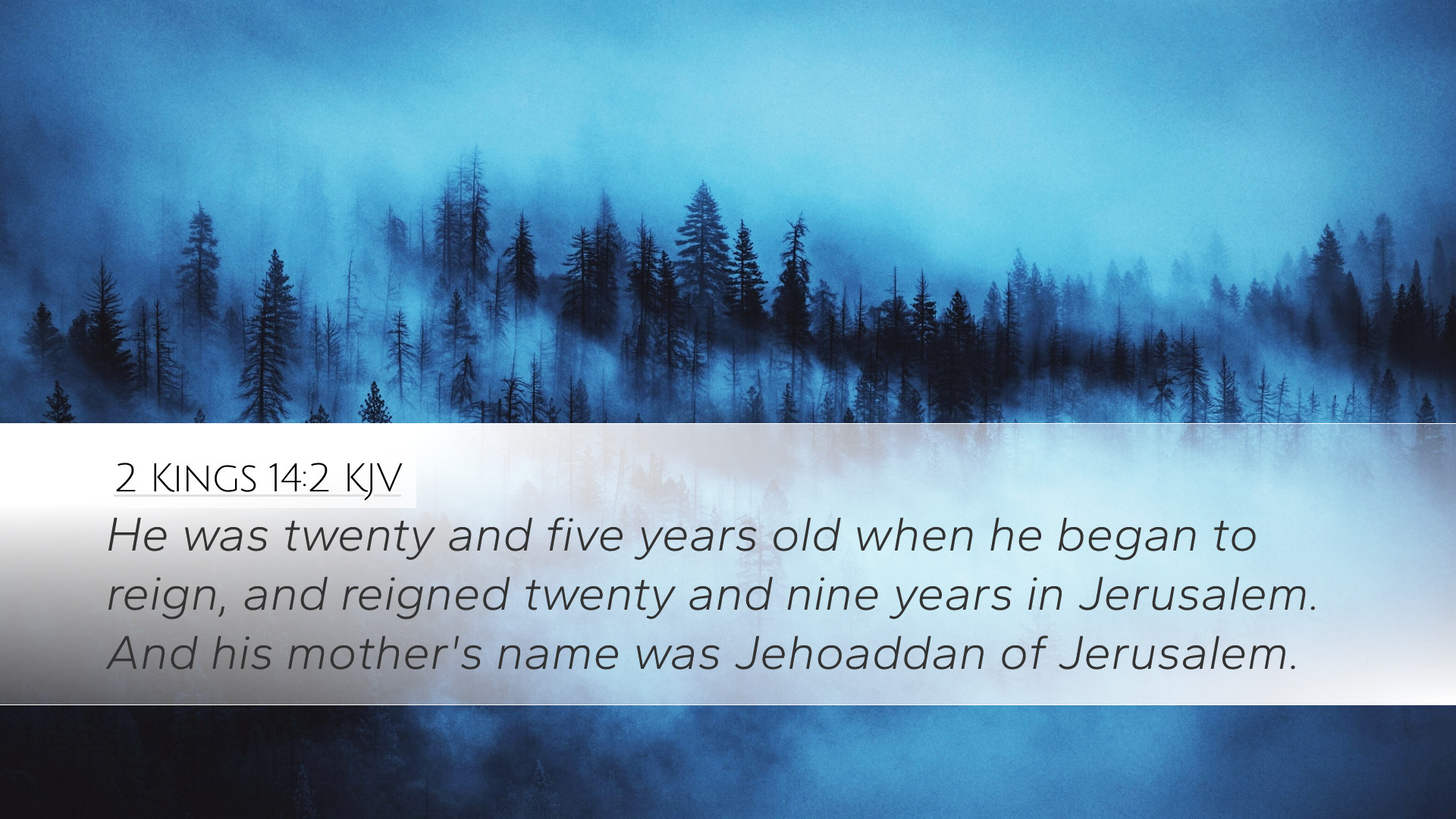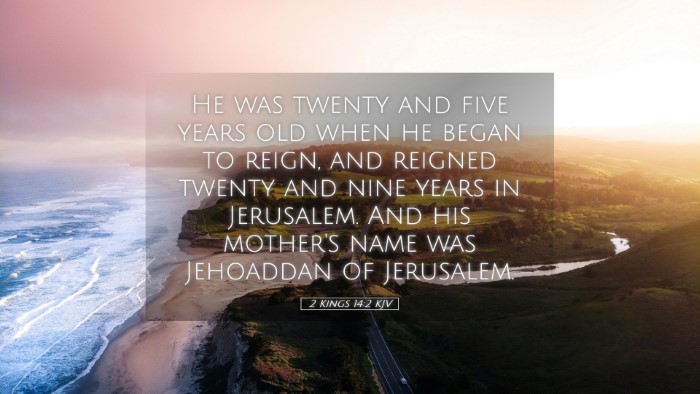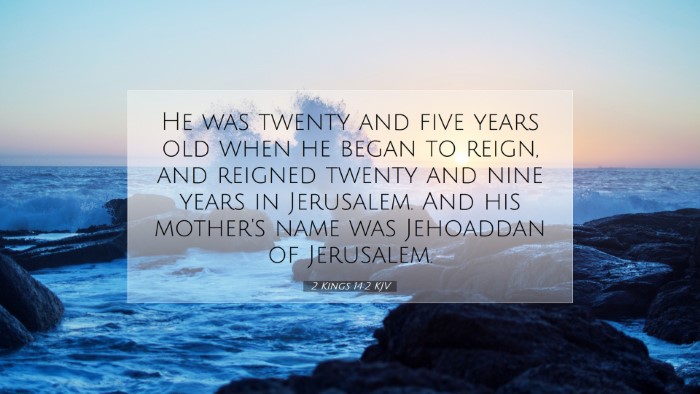Commentary on 2 Kings 14:2
Verse Context: 2 Kings 14:2 states, "He was sixteen years old when he became king, and he reigned for fifty-two years in Jerusalem. His mother's name was Jehoaddan; she was from Jerusalem."
Introduction
The narrative of 2 Kings 14:2 introduces us to Amaziah, the king of Judah. His brief description in this verse provides essential insights into his character, reign, and the historical context of Judah during his time. The verse emphasizes his youth at ascension, the length of his reign, and gives a glimpse into his familial background. Understanding each of these aspects can enrich our knowledge of the biblical narrative surrounding King Amaziah.
Historical Context
Amaziah became king at the age of sixteen, which aligns with the historical precedent in the ancient Near East where young rulers were not uncommon. His reign of fifty-two years places him among the longer-serving kings of Judah, suggesting a period of relative stability compared to some of his predecessors.
Public Domain Insights:
-
Matthew Henry:
Henry highlights how youth does not preclude one from divine appointment. He asserts that despite his young age, Amaziah's ascension to the throne signifies that God is capable of using individuals at all stages of life for His purposes.
-
Albert Barnes:
Barnes draws attention to the implications of Amaziah’s prolonged reign, indicating that this stability allowed for significant events in Judah's national life. It emphasizes that such durations in leadership can reflect the will of God regardless of the leader’s righteousness.
-
Adam Clarke:
Clarke notes Amaziah's family background, pointing out the importance of his heritage and its potential influence on his reign. Jehoaddan, his mother, represents a means through which religious traditions and attitudes could have shaped his governance.
Youth and Leadership
Amaziah's youthful ascension presents a dual perspective on leadership. His reign invites reflection on the nature of leadership in youth. While some may consider age a prerequisite for wisdom, the Lord's choice of leadership transcends human limitations.
-
Matthew Henry:
Henry asserts the importance of divine favor, suggesting that God’s calling can empower the youth to fulfill significant roles in His plan. This serves to encourage young leaders today to seek God's guidance and to understand their potential in service.
-
Albert Barnes:
Barnes adds a cautionary note regarding the impulsiveness often associated with youth, emphasizing the significance of mentorship and wise counsel in the development of a young leader's capabilities.
Duration of Reign
A reign of fifty-two years is notable within the biblical narrative. It suggests a period of stability and relative peace, allowing for institutional development within Judah.
-
Adam Clarke:
Clarke discusses how the duration of Amaziah's reign allows for both challenges and successes. Extended reigns provide opportunities for significant changes and reforms, which may lead to a lasting impact on the spiritual and social fabric of the nation.
-
Matthew Henry:
Henry reflects on the providence of God, suggesting that a long reign can be seen as a blessing. It allows a king to consolidate power and implement policies that align with God's covenant, although the character and decisions of the ruler play a crucial role in this outcome.
Mother’s Influence
Jehoaddan’s mention introduces the significance of maternal influence in the lives of leaders. Amaziah's mother is credited as a person of impact in his early years, potentially influencing his values and decisions.
-
Albert Barnes:
Barnes emphasizes the role of family heritage and the implications it carries for leadership. Jehoaddan’s identity, associated with Jerusalem, suggests a connection to the city’s spiritual and cultural life.
-
Adam Clarke:
Clarke draws attention to the potential spiritual legacy passed from mothers to sons, highlighting that a godly mother can instill in her children the importance of righteousness and leading by example.
Theological Reflections
This verse encapsulates themes of divine sovereignty, human responsibility, and the intertwined nature of personal faith and governance. Leaders must understand the weight of their decisions and their impact on God’s people.
The lessons from Amaziah's youth, the length of his reign, and the influence of his mother provide a template for reflection among contemporary leaders and believers:
- Divine Calling: Recognize that age does not limit one’s capacity to lead.
- Importance of Wisdom: Seek counsel and wisdom to make godly decisions.
- Heritage Matters: Understand the influence of background on one’s leadership style and values.
Conclusion
2 Kings 14:2 serves as a profound reminder of God’s ability to use individuals from all walks of life, including the young. Amaziah’s reign, influenced by family legacy and divine purpose, reflects the complex interplay between personal faith and societal leadership.
The insights drawn from public commentaries deepen our understanding of this verse and offer a multifaceted examination of what it means to lead, worship, and serve faithfully in the context of God’s overarching narrative.


